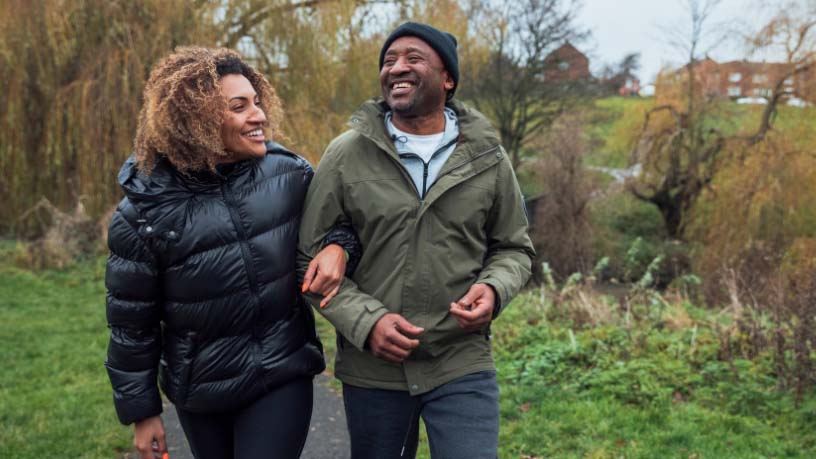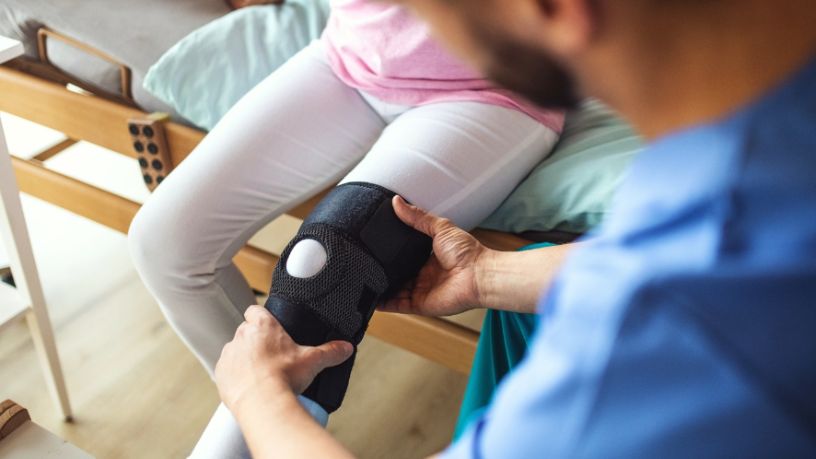Knee surgery is an intensive process that requires rehabilitation.
Key takeaways
Different people will have different recovery experiences. Find out what it looked like for Ron and Kabir.
Get Ron and Kabir’s top 8 tips for knee surgery rehab and recovery.
Knee surgery rehabilitation requires patience and persistence. While you might feel eager to rush through it, it’s an ongoing process that can take up to a year before you’re fully recovered, and sometimes longer.1
Committing to a rehab program will play a crucial role in helping you get back on your feet and back to the activities you love. So, it can help to start the process equipped with some realities.
Here, we look at 2 different stories of injury, surgery and rehab.
Ron's story
By the age of 77, Ron Reid had had 2 knee reconstructions, one on each side. He’d learned some important lessons about rehab along the way.
After his first operation, Ron had a bad reaction to his pain medication and wound up in the intensive care unit with his leg bent for a few days. As a result, he found it hard to straighten his knee.
This set back his recovery. “I knew I needed to straighten it out right away,” says Ron. “Second time round, I truly knew the importance of rehabilitation, so I worked harder on my strength exercises.”
He focused on strengthening his knee prior to the surgery, too. ‘Prehab’ involves working with a physio to prepare your knee and help speed up recovery after the operation. Ron says this made a world of difference.
For Ron, continuing his rehab at a gym after his hospital rehab also helped him get back to his active lifestyle.
“After you’re finished with the hospital rehab, you don’t really fire up,” he says. “You need somewhere to go to help you along with your exercises, just to be a bit more supported.”
Ron says that after a year of rehab, he would try to do some physical work at least twice a week. He felt his knee was 90 percent recovered, and he felt 100 percent better than he did prior to both surgeries.
Kabir's story
29-year-old Kabir Sengupta ruptured his anterior cruciate ligament (ACL) playing mixed netball.
Following the accident, he iced his injury and thought that would be the only treatment required. But after 5 weeks, he was still hobbling around without improvement.
An MRI confirmed the news. “I felt quite dark when the physio looked at me and said ‘you’ve got a ruptured ACL,’” says Kabir. “I almost felt quite depressed.”
One minute, Kabir was playing sport. The next, he was embarking on a year-long journey, starting with ACL reconstruction surgery followed by a rigorous rehab program.
“I had a really good physio and he explained the entire process to me,” says Kabir. “I was told from the very start that the surgery is the first part but equally as important is the rehab, which would take at least 12 months.”
Kabir decided that there was no point being upset about it. Instead, he treated his ACL surgery recovery as the most important thing in his life.
Once I had the surgery, I had a brand-new knee. I felt like a baby in one leg, learning how to walk again.
“The first 3 months were the most intense, because you’re on very heavy pain killers,” Kabir adds. “Which you need to take in order to carry out the physio sessions comfortably.”
During the first week of his recovery, Kabir did 20 minutes of rehab at home 3 times a day. As he got stronger, he scaled that back to once a day.
“It became the most important part of my day," he says, “because I was so focused on getting back to the things I enjoyed.”
For Kabir, it was important that he trusted his physio and surgeon, and felt comfortable asking questions that would help him know what to expect from the process.
“One of the things that helped me is knowing I wasn’t in control of this situation,” he says. “Having that strong bond between myself, the physio and the surgeon was, I believe, the reason I was so successful with the rehabilitation.”
Kabir says that 11 months after his ACL surgery, his knee had completely recovered. He was even training for a marathon.
Bupa Health Programs
Discover our programs designed to help you recover and stay out of hospital where you can.
Ron and Kabir's top 8 rehab and recovery tips
- Straighten your knee as soon as possible after surgery.
- Ensure you have space to do your rehab at home.
- Find the right pain medication and take it so you can continue your physio work.
- If possible, do strengthening work before surgery.
- Find a doctor and physio you trust.
- Ask as many questions as possible so you’re prepared for what’s ahead.
- Make your rehab and recovery your number one priority.
- Continue strengthening work to protect your knees into the future.
Resources
Musculoskeletal Health Australia provides information and support for people living with arthritis and musculoskeletal conditions. Visit their website or call them on 1800 263 265.
Pain Australia works towards improving the quality of life for those living with pain. Visit their website for resources and support, including their National Pain Services Directory.
NSW Government Health’s Patient Roadmap is a handy step-by-step guide to preparing for and recovering from surgery.
The Australian Physiotherapy Association can help you find a physio near you.

At Bupa, trust is everything
Our health and wellbeing information is regularly reviewed and maintained by a team of healthcare experts, to ensure its relevancy and accuracy. Everyone's health journey is unique and health outcomes vary from person to person.
This content is not a replacement for personalised and specific medical, healthcare, or other professional advice. If you have concerns about your health, see your doctor or other health professional.
1Cleveland Clinic. (2023). Knee Replacement. Cleveland Clinic.
You might also like...
5 ways to boost your recovery after knee surgery
Recovering from knee surgery can be a hard process. Here are 5 tips to make your recovery as smooth as possible.
What you need to know about knee replacement surgery
A knee replacement or revision can improve your mobility and quality of life, but it’s still a major surgery. So, what do you need to know about your knees?
7 things I wish I knew before knee surgery
Knee surgery is a major operation that may require months of intensive recovery. Discover 7 common insights from those who’ve done it.
What you need to know before knee reconstruction surgery
Find out everything you need to know about knee reconstruction surgery and how to set yourself up for your best possible recovery.





